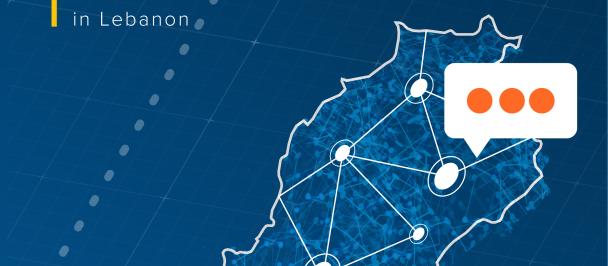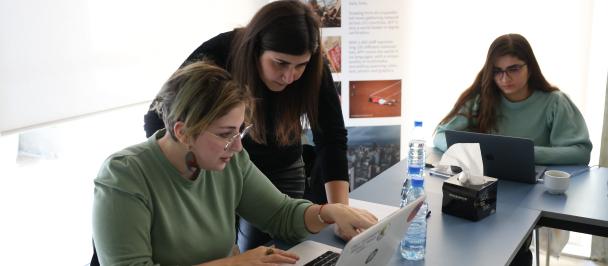Beirut, 31 March 2022 – The Directorate General of Local Administrations and Councils (DGLAC) invited mukhtars, municipalities and unions of municipalities (UoMs) to discuss ways to strengthen the role of mukhtars in supporting local communities during a third episode of the DGLAC talk show series. The talk show series is supported by the United Nations Development Programme (UNDP) and the United Nations Human Settlements Programme (UN-HABITAT), with funds from the EU. The event was broadcasted online to participants across the country.
The discussion highlighted the crucial role mukhtars play but emphasized the need to further build their capacity, including around digital knowledge, to enable them to better serve their communities. The session allowed participating mukhtars to directly voice challenges, concerns, and solutions to national level decision makers through a Q&A session, thereby contributing to national policy dialogue.
Mukhtara Ms. Josiane Khalil, of Zouk Mekael, first Mukhtara in Kessrwan District and one of the few women in this field said: “The role of mukhtars is really important, they can have a great impact on citizens’ everyday life and needs, and the state should strengthen this role to streamline the functioning of local public administration”.
The need to strengthen national support to mukhtars was also emphasized. Mr. Jalal Kebrit, Director General of CFML, said: “We always seek to support mukhtars so they can better support their communities. We are working on better digitization and automation at the Cooperative Fund of Mukhtars in Lebanon.”
“To serve local communities better, DGLAC should work hand in hand with mukhtars and municipalities to achieve smart governance that puts citizen needs first”, said André Sleiman, the country representative of Democracy Reporting International (DRI).
Panelist also emphasized the linkages between mukhtars and municipalities: “DGLAC supports municipalities and unions of municipalities and facilitates their role. Mukhtars are an important part of the local governance in Lebanon, and their role interlinks to a great extent with municipalities in the delivery of more efficient services to our citizens and communities.” said DGLAC Director General Faten Abou Hassan.
The DGLAC talk show series is delivered under the patronage of the Ministry of Interior and Municipalities, with support from the Municipal Empowerment and Resilience Project (MERP). MERP is a joint initiative implemented by the United Nations Development Programme (UNDP) and the United Nations Human Settlements Programme (UN-Habitat) and is funded by the European Union through its Regional Trust Fund in Response to the Syrian Crisis “Madad Fund”.
DGLAC initiated the talk show series for mukhtars, municipalities and unions of municipalities, to discuss key topics of local concern. Two episodes were delivered during 2021, one on the updating of the municipal law and a second on the DGLAC support to local authorities to explore new ways to generate revenue within the current economic crisis. In 2022, DGLAC will continue the series, including this episode dedicated to mukhtars. The next DGLAC talk show will be hosted 2nd quarter of 2022 and will focus on gender inclusion at municipal level.
END
For more information please contact:
Aline Kiwan, MERP Media and Communication Officer, at aline.kiwan@un.org, mobile 03-294070
Note to editors
About the Directorate General of Local Administrations and Councils (DGLAC)
The Directorate General of Local Administration and Councils (DGLAC) fulfils the Ministry of Interior and Municipalities (MoIM) municipal support function as stipulated in the 1977 Municipal Act and its amendments. By law, MoIM is
mandated with the provision of administrative control and oversight over unions of municipalities and municipalities. The DGLAC plays a crucial role in supporting the ministry in this mandate and therefore supporting capacity-building, and evidence-based planning for municipalities and unions of municipalities, also known as “local administrations” or local authorities. The main provisions regulating the DGLAC’s mission are also outlined in Art. 28–43 of Decree No. 4082, issued on 14 October 2000 organizing the MoIM.
About the Cooperative Fund of the Mayors in Lebanon (CFML)
The Cooperative Fund of the Mayors in Lebanon is a public institution under the tutelage of the Ministry of Interior and Municipalities. It was established by Decree No. 10626 of August 13, 2003 – “Establishing a public institution called the Cooperative Fund of the Mayors in Lebanon.” It is concerned with providing various social services to the mayors of Lebanon. At the present time, the fund mainly provides the following services: end of service compensation, death assistance, marriage grant, and birth grant, according to Decree No. 5729 dated October 8, 2019 – “The System of Services for the Mayors in Lebanon”. The Fund undertakes the process of selling the Mukhtar stamp to the Lebanese mayors, which was set at a value of 250 Lebanese pounds under Law No. 273 dated 5/1/2001 and then amended by Law No. 270 dated 15/4/2014 to become 1000 Lebanese pounds later.The Fund’s Board of Directors and its General Manager were appointed by Decree No. 5417 dated 10/11/2010: “Appointment of the Chairman and Members of the Board of Directors of the Cooperative Fund of the Mayors in Lebanon”.
About the Municipal Empowerment and Resilience Project (MERP)
MERP is a joint project by the United Nations Development Programme (UNDP) and the United Nations Human Settlements Programme (UN-Habitat). The Project is being implemented between 2019 and 2022 in partnership with the Ministry of Interior and Municipalities (MoIM) and funded by the European Union (EU), through its Regional Trust Fund in Response to the Syrian Crisis, the EU “Madad Fund”. The project aims to strengthen the long-term resilience of subnational authorities in Lebanon as well as host communities and displaced persons affected by the Syrian crisis. Learn more at https://bit.ly/3hBveux
About the European Union (EU)
The European Union supports Lebanon’s stability, independence and sovereignty, its prosperity and democratic order. It strives also to help protect its environment and natural resources by supporting sustainable enterprise and development. The European Union is also committed to the promotion and protection of human rights in Lebanon including defending gender equality, children’s rights and freedom of expression.
The EU Delegation in Lebanon represents the European Union to the Republic of Lebanon with the objective to maintain and develop mutual beneficial relations. It engages in political, social and economic development activities on behalf of the European Union and based on the most pressing needs of the country of Lebanon.
Learn more on the work of the EU in Lebanon or follow on Twitter, Facebook and Instagram at @EUinLebanon
Learn more on the EU Regional Trust Fund in Response to the Syrian Crisis, the EU Madad Fund, or follow on Twitter at @EU_NEAR, on Facebook at EU Neighbourhood & Enlargement and on Instagram at EU_NEAR
About the United Nations Development Programme (UNDP)
UNDP is the leading United Nations organization fighting to end the injustice of poverty, inequality and climate change. Working with our broad network of experts and partners in 170 countries, we help nations to build integrated, lasting solutions for people and the planet.
Learn more at www.lb.undp.org or follow on Twitter at @UNDP_Lebanon, on Facebook at UNDP Lebanon and on Instagram at UNDP_Lebanon
About the United Nations Human Settlements Programme (UN-Habitat)
UN-Habitat works in over 90 countries supporting people in cities and human settlements for a better urban future. Working with governments and local partners, its high impact projects combine world-class expertise and local knowledge to deliver timely and targeted solutions. The 2030 Agenda for Sustainable Development includes a dedicated Goal on cities, SDG 11 – to make cities inclusive, safe, resilient and sustainable.
Learn more at www.unhabitat.org/lebanon or follow on Twitter at @UNHabitatLB, on Facebook at UN-Habitat Lebanon and on Instagram at UNHabitatLB

 Locations
Locations
